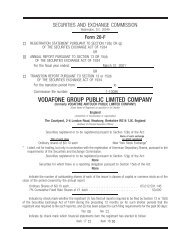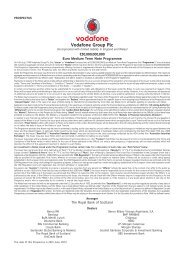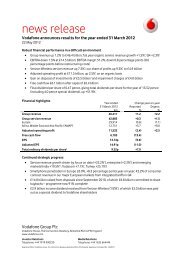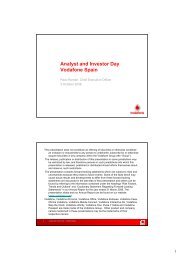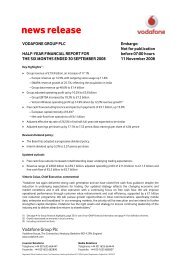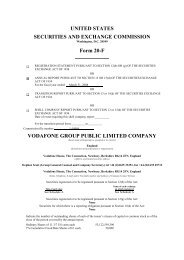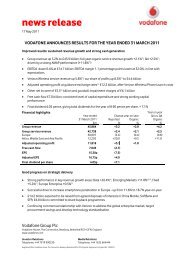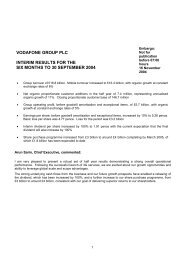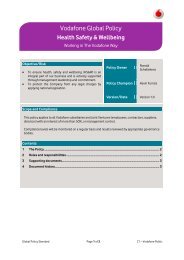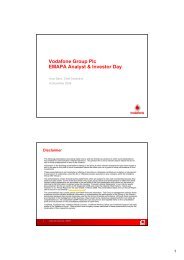You also want an ePaper? Increase the reach of your titles
YUMPU automatically turns print PDFs into web optimized ePapers that Google loves.
Mobile telecommunications KPIs<br />
Germany Italy Spain UK O<strong>the</strong>r Europe<br />
Closing customers (’000) – 2008 34,412 23,068 16,039 18,537 18,515 110,571<br />
– 2007 30,818 21,034 14,893 17,411 17,007 101,163<br />
Closing 3G devices (’000) – 2008 5,836 5,905 5,264 3,632 3,555 24,192<br />
– 2007 3,720 3,762 2,890 1,938 2,353 14,663<br />
Voice usage (millions of minutes) – 2008 42,010 37,447 35,031 37,017 31,108 182,613<br />
– 2007 33,473 32,432 30,414 31,736 28,491 156,546<br />
See page 155 for definition of terms<br />
The Group’s strategy in <strong>the</strong> Europe region is to drive additional usage and revenue<br />
from core mobile voice and messaging services and to reduce <strong>the</strong> cost base in<br />
an intensely competitive environment where unit price declines are typical each<br />
year. The 2008 financial year saw a strong focus on stimulating additional usage<br />
by offering innovative tariffs, larger minute bundles, targeted promotions and<br />
focusing on prepaid to contract migration. Data revenue growth was strong<br />
throughout <strong>the</strong> region, mainly due to <strong>the</strong> higher take up of mobile PC connectivity<br />
devices. The Group’s ability to provide total communications services was enhanced<br />
through <strong>the</strong> acquisition of Tele2’s fixed line communication and broadband<br />
services in Italy and Spain in <strong>the</strong> second half of <strong>the</strong> year.<br />
Revenue<br />
Revenue growth of 6.1% was achieved for <strong>the</strong> year ended 31 March 2008,<br />
comprising 2.0% organic growth, a 0.7 percentage point benefit from <strong>the</strong> inclusion<br />
of acquired businesses, primarily Tele2, and 3.4 percentage points from favourable<br />
movements in exchange rates, largely due to <strong>the</strong> streng<strong>the</strong>ning of <strong>the</strong> euro<br />
against sterling. The impact of acquisitions and exchange rate movements on<br />
service revenue and revenue growth in Europe are shown below:<br />
Impact of<br />
exchange Impact of<br />
Organic rates acquisitions Reported<br />
growth Percentage Percentage growth<br />
% points points %<br />
Service revenue<br />
Germany (4.8) 3.8 – (1.0)<br />
Italy (2.0) 4.1 2.6 4.7<br />
Spain 8.1 4.7 1.6 14.4<br />
UK 5.8 – – 5.8<br />
Arcor 8.5 4.7 – 13.2<br />
O<strong>the</strong>r Europe 2.4 4.2 0.3 6.9<br />
Europe 2.1 3.4 0.8 6.3<br />
Revenue – Europe 2.0 3.4 0.7 6.1<br />
Service revenue grew by 6.3%, or by 2.1% on an organic basis, with strong growth<br />
in data revenue being <strong>the</strong> main driver of organic growth. Revenue was also<br />
positively impacted by <strong>the</strong> 9.3% rise in <strong>the</strong> total registered mobile customer base<br />
to 110.6 million at 31 March 2008. These factors more than offset <strong>the</strong> negative<br />
effects of termination rate cuts, <strong>the</strong> cancellation of top up fees on prepaid cards in<br />
Italy resulting from new regulation issued in March 2007 and <strong>the</strong> Group’s ongoing<br />
reduction of European roaming rates. Business segment service revenue, which<br />
represents 28% of European service revenue, grew by approximately 5% on an<br />
organic basis, driven by a 21% growth in <strong>the</strong> average business customer base,<br />
including strong growth in closing handheld business devices and mobile PC<br />
connectivity devices.<br />
Voice revenue increased by 1.3%, but declined by 1.8% on an organic basis,<br />
with <strong>the</strong> difference being due to <strong>the</strong> effect of favourable movements in exchange<br />
rates. The organic decrease was primarily due to <strong>the</strong> effect of lower prices resulting<br />
from Group initiatives and regulation-driven reductions.<br />
•<br />
•<br />
•<br />
Outgoing voice revenue remained stable on an organic basis, as <strong>the</strong> 20.1%<br />
increase in outgoing call minutes, driven by <strong>the</strong> 9.0% higher outgoing usage<br />
per customer and <strong>the</strong> higher customer base, was offset by <strong>the</strong> fall in <strong>the</strong><br />
effective rate per minute reflecting continued price reductions and <strong>the</strong> effect<br />
of <strong>the</strong> cancellation of top up fees in Italy.<br />
Incoming voice revenue fell by 4.6% on an organic basis as a result of ongoing<br />
termination rate reductions throughout <strong>the</strong> region. The effective annual rate<br />
of decline of 12%, driven by termination rate cuts in Germany, Italy and Spain,<br />
was partially mitigated by <strong>the</strong> 8.3% growth in incoming voice minutes.<br />
Roaming and international visitor revenue declined by 8.0% on an organic basis,<br />
as expected, principally from <strong>the</strong> impact of <strong>the</strong> Group’s initiatives on retail and<br />
wholesale roaming and regulatory-driven price reductions, which more than<br />
offset growth of 13.3% in voice minute volumes.<br />
Messaging revenue grew by 11.5%, or by 8.1% on an organic basis, driven by<br />
good growth in usage, up 28.1%, particularly in Italy and <strong>the</strong> UK, resulting from<br />
<strong>the</strong> success of a number of promotions and <strong>the</strong> higher take up of tariff bundles<br />
and options.<br />
Strong growth of 40.5%, or 35.7% on an organic basis, was achieved in data<br />
revenue, primarily from a 61.5% rise in <strong>the</strong> number of mobile PC connectivity<br />
devices, including <strong>the</strong> successful launch of <strong>the</strong> <strong>Vodafone</strong> Mobile Connect USB<br />
modem in <strong>the</strong> business and consumer segments, coupled with <strong>the</strong> strong<br />
promotion of data tariffs across many European markets.<br />
Fixed line revenue increased by 22.4%, or by 4.7% on an organic basis, with 12.5<br />
percentage points of this <strong>report</strong>ed growth being contributed by <strong>the</strong> acquisition<br />
of Tele2’s operations in Italy and Spain in December 2007. Organic growth was<br />
mainly due to <strong>the</strong> increase in Arcor’s service revenue. At 31 March 2008, Europe<br />
had 3.5 million fixed broadband customers.<br />
Germany<br />
At constant exchange rates, service revenue declined by 4.8%, mainly due to an<br />
8.3% decrease in voice revenue resulting from a reduction in termination rates,<br />
<strong>the</strong> full year impact of significant tariff cuts introduced in <strong>the</strong> second half of<br />
<strong>the</strong> 2007 financial year and reduced roaming rates. This was partially offset by<br />
32.1% growth in outgoing voice minutes, driven by a 9.1% increase in <strong>the</strong> average<br />
customer base and higher usage per customer. Messaging revenue fell 8.7% at<br />
constant exchange rates due to lower usage by prepaid customers and new tariffs<br />
with inclusive messages sent within <strong>the</strong> <strong>Vodafone</strong> network, which stimulated an<br />
8.8% growth in volumes but was more than offset by <strong>the</strong> resulting lower rate per<br />
message. These falls were partially offset by 34.7% growth in data revenue at<br />
constant exchange rates, largely due to a 71.9% increase in <strong>the</strong> combined number<br />
of registered mobile PC connectivity devices and handheld business devices,<br />
particularly in <strong>the</strong> business segment, as well as increased <strong>Vodafone</strong> HappyLive!<br />
bundle penetration in <strong>the</strong> consumer segment.<br />
<strong>Vodafone</strong> Group Plc Annual Report 2008 35




